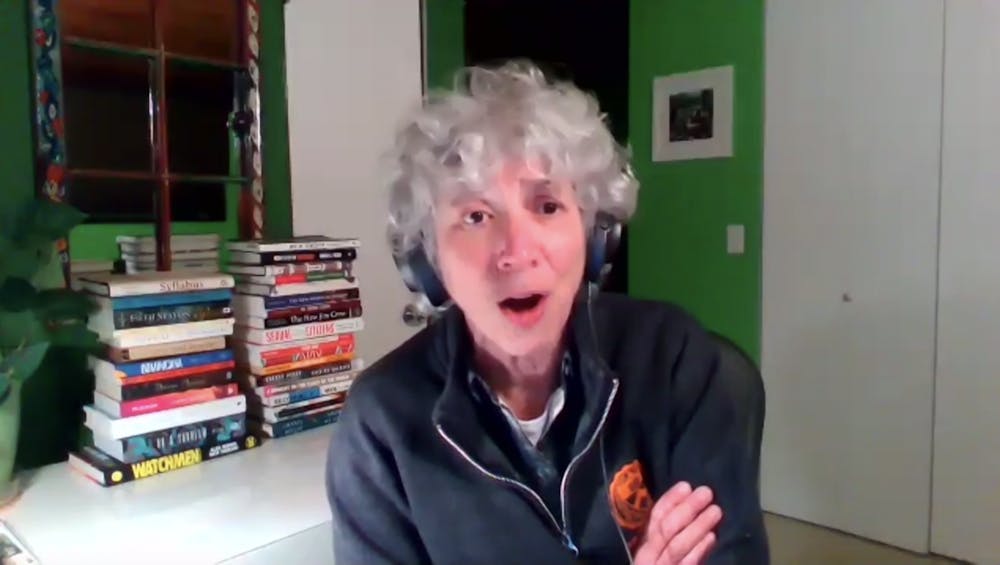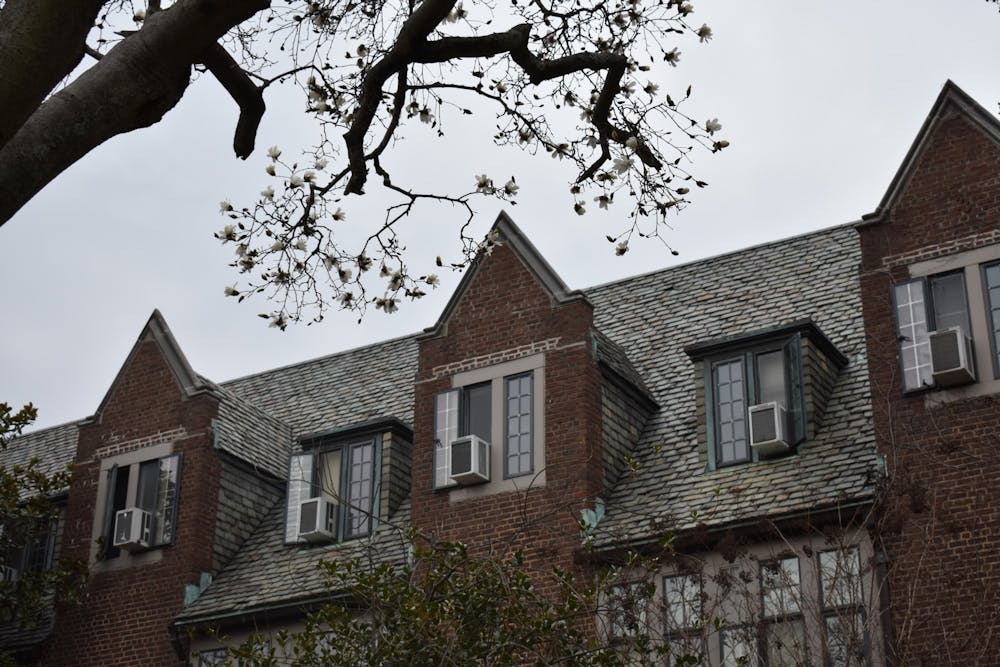The University will be able to distribute a vaccine to faculty, staff, students, and their households as soon as it is available beyond top-priority populations like health care workers, Executive Director of Environmental Health and Safety Robin Izzo told students at a town hall last night.
“Princeton University is known as a fixed facility for the vaccine distribution, so we are prepared and when the vaccine becomes available, we'll be able to distribute it,” Izzo said.
On Dec. 1, Dean of the College Jill Dolan, Vice President for Campus Life Rochelle Calhoun, and other administrators responded to questions about the spring 2021 term in a town hall organized by Undergraduate Student Government (USG).
The participants discussed a wide range of topics, from housing and dining to virtual programming to testing protocol. 1,052 individuals attended the event, which was moderated by USG President Chitra Parikh ’21 and USG Director of Communications Hannah Kapoor ’23.
Move-in for the upcoming term will begin as early as Jan. 8, Director of Housing Dorian Johnson explained.
“The primary reason for such a long period is that students will be tested as soon as they arrive and we have to find a complex that will allow students to cycle through, be tested, but also ensure the safety of the staff who will be overseeing the testing clinic as well. So potentially as early as the 8th, but there may be dates later than that,” he said.
Dolan echoed the urgency to move in before Jan. 17, the latest date the University will allow students to move in.
“Otherwise we can't establish the bubble that we're trying to establish that's required to keep everyone safe,” she said.

Asked to unpack the spring decision, Calhoun explained that a major factor which drove the University to invite all students to campus was the opening of an on-campus testing laboratory capable of supporting the student body.
Upon arrival, students will be tested at an in-person clinic, where they will learn how to take their own samples. Students will be tested twice each week, with designated areas on campus to pick up test kits and drop off samples, according to Izzo.
Students living near campus, within Mercer County or Plainsboro Township, will also be permitted to participate in the campus testing protocol and will be able to access all campus resources available to on-campus students, excluding dorm rooms and other residential spaces. For students living off campus, there will be test collection areas throughout campus and in some off-campus locations.
Izzo explained that there is a process in place if a student were to test positive for COVID-19.

“The student will immediately go to an isolation space that will be in a different dormitory. They will have food and such delivered to them in the isolation space. And their close contacts would then need to quarantine and that quarantine would take place in their rooms, in their own room,” Izzo said. “They would have to stay in isolation until released by University Health Services, which means at least 10 days.”
One student asked whether the University would potentially reverse its decision to bring students back, as was the case in the fall term.
“Our intention is to move forward with this plan and to have all the students who are able to come back to campus in the spring return,” said Vice President for Communications and Public Affairs Brent Colburn.
Another asked a question surrounding the status of first-year international students who, due to Immigrations and Customs Enforcement (ICE) restrictions, must be enrolled in at least one in-person class to obtain a visa and live on campus. Despite the expectation that most instruction will remain online, Dolan said the University will guarantee that all international students who need to take an in-person course are able to do so.
Dolan explained that she will be teaching a class with an in-person component for international students centered around American pop culture, with multiple colleagues in the Office of the Dean of the College serving as preceptors for the course.

Dean of the College Jill Dolan speaking at the event.
“We have been very conscious of the challenges our international students have faced learning remotely in various time zones as well as the challenges of securing visas, especially for our first-year students,” said Dolan.
Dolan also explained that an on-campus orientation was in the works for the entire class of first-years.
“There will be an orientation for first-year students who haven’t had the opportunity to be on campus. It of course will begin virtually, but we hope at some point there will be opportunities to tour campus and do other things,” she said.
For those intending to live on campus, Calhoun explained that enforcement of the Social Contract is of paramount importance to ensuring collective health and safety.
“We will also be very quick and very swift to address non-compliant behavior because what we have learned from our semester and from the peers and others we have spoken with about how they were able to have a safe semester was that they got high compliance and community buy-in and a sense of that as a community responsibility, as well as when people stepped outside of compliance there was a swift response,” she said. “We expect that that will be true here, I hope.”
Asked whether students living off campus would be able to live with roommates not participating in testing protocols, Calhoun said she would bring the question to the University’s public health team and update the FAQs accordingly. She did say, however, “The more porous we make our community, the more likely we have an outbreak.”
Several more technical questions were asked about housing. The University plans to decide rooming assignments based on the room selection process last year, with first-year students living with their zee groups. Students living in multi-person rooms have a very low chance of being assigned a new roommate randomly in the event of a vacancy, according to Johnson.
“Our last option is to place a random person into a suite,” Johnson explained. “If there's a vacancy in the suite we will reach out to the student in that suite, and there will be the option to indicate if there are specific students that they would like to be added to their suite.”
The University’s original announcement also noted that “depending on demand, some students may be housed proximate to campus rather than on it.” At the town hall, Johnson added that the University believes it will be able to accommodate all students in undergraduate dorms. If not, he said they would rely on other spaces in the University’s housing inventory like graduate student or faculty spaces within walking distance of campus.
In addition, students living in emergency housing will remain in their current assignments to avoid relocation. The housing appeals process will continue this year if students are dissatisfied with their housing assignment for the spring term. The University plans to work with students until Dec. 18, when housing contracts are distributed, to make necessary adjustments.
Hours prior to the town hall, the University announced that eating clubs will not operate in the spring 2021 term. Calhoun confirmed that co-ops will also not be operational.
Currently, only certain dining halls are in operation, though if the public health situation improves, that may change. In addition, late meal will not be offered in the spring.
Assistant Vice President of Campus Dining Smitha Haneef explained that the dining staff is making the most of the current situation.
“For every meal period, lunch and dinner, our chefs are crafting a menu that will be different by meal period. But we’re right now preparing for a similar set of offerings at all dining halls for any given meal period,“ she said.
Haneef outlined what a typical menu would look like during the semester.
“So in any given meal period you can expect to see a hot entree — vegetarian, vegan, meat-based entree — paired with a couple of sides of vegetables, grains, rolls, a dessert, and a green salad or side salad. That's from a menu standpoint for now,” she said.
She also noted that dietary restrictions would be accommodated by the staff, provided the dining staff was made aware of the restriction in advance.
Responding to a question regarding commencement for the Class of 2021, Dolan said to “stay tuned.” Because the event would not occur until late into the semester, she said the University still has time for the necessary decision-making process.
In terms of open spaces on campus, Frist Campus Center, Firestone Library, and Dillon Gymnasium will be open under modified conditions. In Frist, the furniture has been rearranged to promote social distancing. Firestone now has a reservation system in place, and Dillon Gym is operating by assigning time slots.
The morning after the town hall, Associate Dean of Undergraduate Students Jarrett Fisher informed student group leaders that student organization facilities — including Whig Hall, Campus Club, and the Student Publications Center at 48 University Place — would remain closed “until further notice.” While the University may revisit access depending on public health guidelines, the facilities are expected to remain closed throughout the semester.
The University will host a similar town hall for parents and families today at 5 p.m EST.








